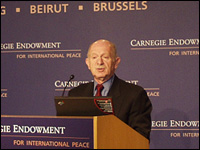Registration
You will receive an email confirming your registration.
IMGXYZ815IMGZYX Mark Schneider, Senior Vice President at the International Crisis Group (ICG), spoke at the Carnegie Endowment for International Peace on November 20 to talk about the state of emergency recently declared in Pakistan.
Schneider called Pakistani President Pervez Musharraf’s declaration of emergency a de facto imposition of martial law because it went beyond the constitutional authority given to the President. And though recent days have seen some encouraging signs—3,000 political prisoners have been released, with another 2,500 possibly soon to follow—a return of democracy does not seem imminent, Schneider said, since Musharraf has yet to set a date for the end of emergency, for Musharraf to step down from his post as Chief of Armed Services, nor the return of constitutional rule. Schneider said that the elections, scheduled for January, will be meaningless if the institutions and freedoms necessary to the democratic process are not restored early enough to ensure a real political campaign.
Many have argued that U.S. must not compromise the strengths of its counter-terror operations by pressing too hard for democratic reform in Pakistan, said Schneider. However, such concerns miss the fact that Musharraf’s government has actually been a lackluster counter-terror partner, he responded. The Pakistan government is aware that Jihadist organizations are active in Pakistan, and that Al Qaeda and the Taliban are operating in major cities, not just in FATA and the Northwest Frontier Provinces. Schneider’s advice, therefore, was that the U.S. needs to support the democratic process, especially since elections will likely bring to power one of the two major secular parties. Schneider noted that the secular parties command as high as 80% support among Pakistanis, and for that reason alone would be more successful in fighting terrorism. In addition, Schneider noted that the coalition that backs Musharraf in Parliament is made up of Pakistan’s religious parties, none of which support operations against the Taliban. Electing the secular parties to power would remove that obstacle to sincere and comprehensive counter-terror operations.
IMGXYZ816IMGZYXSchneider advised the U.S. to halt high-level talks and military training with Pakistan, and to suspend non-coalition military aid. He also suggested that the sale of conventional weapons, which are not useful in counter-insurgency operations, be suspended until the constitution and the judiciary is restored.
In the Q&A session, Schneider addressed the concern that instability in Pakistan might leave its nuclear arsenal vulnerable. Schneider noted that the U.S. has been assisting Pakistan in securing its nuclear facilities. But, in general, he noted, Musharraf has not been aggressively confronting suspected proliferators.
One member of the audience asked if very much had changed since 1999, when Musharraf came to power amidst terrible corruption. Schneider said that civil society and the judiciary have become more assertive. Nothing like the protests of the lawyers’ association were seen in 1999. Schneider said U.S. ought to support Pakistani civil society in order to restore democracy and the rule of law.
When asked to speculate on what deputy Secretary of State John Negroponte said to Musharraf in their meeting last week, Schneider speculated that Negroponte warned Musharraf that the U.S. would not be able to maintain the same relationship as it has had with Pakistan in the past, and that a reaction from the congress is likely forthcoming.
Schneider’s remarks were drawn from the new ICG report “Winding Back Martial Law in Pakistan.”
